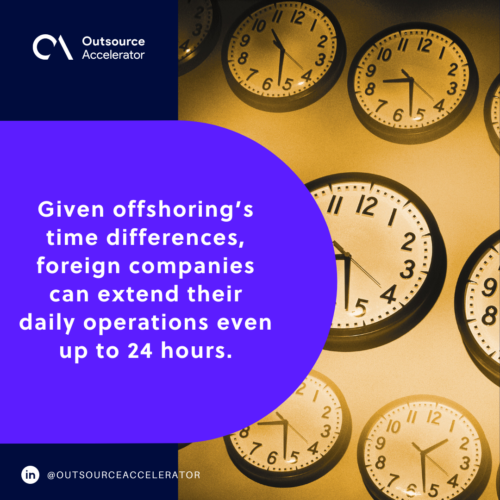Outsourcing options for your business

It is a known fact that outsourcing brings enhanced efficiency to organizations’ daily workflow. At the same time, they are scaling their productivity while reducing their overall costs.
More so, the outsourcing practice has also evolved over the past decades. This continuous evolution has further proved that its benefits outweigh its risks.
What’s more, businesses have a wide array of outsourcing options for their needs, from the types of operational processes, vast talent pool of seasoned experts, to outsourcing locations they prefer to avail services.
The usefulness of outsourcing goes beyond supporting various companies in their growth and development. Especially in the Business Process Outsourcing (BPO) industry, it is a massive contributor to several countries’ economic progress.
Aside from becoming a strategic practice, outsourcing has also served a purpose as companies today combat the impacts of the COVID-19 pandemic.
3 types of outsourcing
Outsourcing involves contracting out parts or several parts of a business process to a third-party service provider. Every organization aims to be successful in its field. However, success does not happen overnight.
Companies always have to think of strategic and intelligent ways to improve consistently, regardless of size or type. Thus, outsourcing is one robust method to remain competitive in the ever cutthroat market industry.

Another beauty of outsourcing is that clients can choose which outsourcing type is most suitable for them.
In addition to that, here are three classifications of outsourcing according to their geographical locations:
Onshore
Onshoring is local outsourcing. This type involves sourcing out a part or several parts of daily operations to an outsourcing provider within the company’s home country.
Part of the advantages of onshoring is that, since both ends are in the same country, they both have the same time zone and speak the same language.
The organization and its extended workforce can perform daily operations simultaneously, and it is also accessible.
While onshoring eliminates cultural and language barriers, it can be costly compared to other outsourcing classifications.
Nearshore
Nearshore outsourcing is when organizations farm out work to an outsourcing partner that is in a neighboring country. These countries can be in the same time zone as the outsourcing client’s home country or minimal time difference.
One good example of this type is when companies in the US nearshore outsource to Canada or Mexico. Besides proximity, other perks of nearshoring are similarities in culture, language, and people. Nearshoring is also considered relatively cheaper compared to onshoring.
Offshore
Lastly, offshoring happens when companies subcontract a portion or portions of their work operations to another country. Unlike nearshoring, the outsourcing vendor in offshoring is from a faraway country from the outsourcing clients’ geographic location.
Offshoring is the most cost-effective form of outsourcing out of the three types. It is also the common reason why a lot of companies opt for offshoring.
The global business process outsourcing scene
Organizations can take full advantage of this strategic practice from any outsourcing destination across the globe. Over the years, it has become a part of businesses to aid their growth and development.
Traditionally, outsourcing is for the manufacturing industry alone. Its services have exponentially grown through decades from the call center, back office, IT functions, and digital marketing.
Outsourcing allows company leaders and their in-house staff to focus on their business core. It also enables a lot of organizations to fill in their talent gap. It is especially true with offshore outsourcing.
Countries that are scarce in skilled IT experts like the US can tap into the vast pool of global IT talents offshore in India and the Philippines.
And speaking of IT outsourcing, it represents a big chunk in the overall global BPO services. In fact, in 2019 global market statistics, the BPO industry was valued at $26 billion. IT outsourcing, on the other hand, reached a whopping $66.5 billion.
Outsourcing in the time of the COVID-19 pandemic has also greatly increased its demand. Organizations have leveraged the use of outsourcing to keep their businesses afloat and their daily operations fully functional.
Outsourcing experts also predict that the global outsourcing market will acquire a 6% annual growth rate within the next five years. Further, this projection will likely reach over $332.4 billion come 2025.

Common types of outsourcing functions
Outsourcing, in general, adds value to businesses no matter what type of industry. It explains why there are thousands of job functions outsourced every year.
These commonly outsourced roles belong to the following:
IT outsourcing
Outsourced IT roles have two categories:
Application outsourcing
Application outsourcing is usually composed of QA & testing services, application development, software implementation & management, and systems maintenance.
Infrastructure outsourcing
Infrastructure outsourcing usually involves overall infrastructure management, network services, data center outsourcing, managed security operations and service desk capabilities.
At present, cloud services, including software, infrastructure, and platform-as-a-service, also make up the IT outsourcing field.
Professional services outsourcing
Professional outsourcing refers to contracting out professionals or specialists to perform different job functions. This outsourcing function typically provides specialized services like accounting, administrative jobs, legal services, and purchasing.
Project-based outsourcing
Project-based outsourcing is typically for companies that need help for specific projects but does not require full-time staff. This outsourcing entails website design, marketing campaigns, and content writing.
Why do foreign companies prefer offshore outsourcing options in developing countries?
As we have mentioned earlier, offshoring is the cheapest method of outsourcing. It is why it is also the most utilized by thriving companies.
Given offshoring’s time differences, foreign companies can extend their daily operations even up to 24 hours. On top of that, they have access to a large pool of global talents and the latest technologies.
Top offshoring destinations in the world
These amazing perks are what attracts more and more foreign companies to offshore in developing countries like the following:
Philippines
The Philippines BPO industry is a significant contributor to the country’s economic growth. Moreover, the Philippine government fully supports the outsourcing sector.
Aside from other outsourcing functions, the country has been famous for its call center services for decades. It is mainly because almost all the population in the country is proficient in speaking the English language. Filipinos’ neutral accent also makes it easier for them to adapt and learn different accents, like the call center agents at SixEleven BPO.
The country is also heavily influenced by Western culture, which explains why it is not hard for Filipinos to understand and converse with westerners.
And of course, the Philippines has been declared as one of the top outsourcing destinations worldwide for years now.
India
India is well known for IT outsourcing services and software development. Besides having an ample supply of IT specialists, the National Association of Software Service Companies (NASSCOM) also supports the industry.
Other outsourced services in the country are customer support and Knowledge Process Outsourcing (KPO) services. Like the Philippines, India also has a low cost of living which translates to reduced labor costs.
Malaysia
Malaysia is an emerging outsourcing destination, specifically in the IT outsourcing industry. Although Malaysia remains a novice in the outsourcing field, its government’s financial plans also cater to the BPO industry in the country.
Malaysia also has a high literacy rate of 98.74%, and it is ranked third in the Asian countries in terms of English proficiency.

Leading outsourcing options for BPO companies worldwide
As for companies that are aiming to outsource, here we have listed 5 of the leading multinational outsourcing companies:
Accenture
Accenture’s name is a derivative of “accent of the future.” This BPO company started in the year 1989, in Dublin, Ireland. It supports various sectors like automotive, travel, banking, communications and media, and life sciences.
Part of its array of services includes digital commerce, artificial intelligence (AI), finance consulting, marketing, and customer experience.
IBM
With over 105 years of industry experience, IBM has entirely made its name in the international outsourcing market. Traditionally, this outsourcing provider is known for its IT-related functions. Over the years, IBM’s offered services have evolved to several outsourcing roles like global process services and more.
Cognizant
Leading global media, Forbes and Fortune, featured Cognizant as one of the top outsourcing providers for data and AI services. It also provides digital engineering, cloud enablement, and enterprise application services.
Concentrix
Concentrix has been known for its specialization in customer engagement and business performance. Over the years, the BPO company has received international awards from various organizations across the globe.
At present, Concentrix has its physical locations around six continents and in over forty countries.
Teleperformance
Teleperformance has been in the outsourcing industry for over four decades now. Meaning it is one of the oldest BPO companies ever established. Its services focus on customer experience, back-office operations, and digital transformation.
Setting aside outsourcing’s great benefits, companies also have to consider certain things before deciding to outsource. More and more organizations these days are tapping into this strategic practice. However, it is also essential to know that it may not always be the same with other companies.
Before making a decision, it is crucial to think about the requirements, budget, and how outsourcing will impact your business.







 Independent
Independent




